×
Filter Results
Filter Results
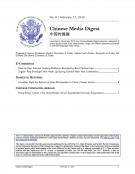
Research
Highlights of this edition: Peer-to-Peer Internet Lending Platforms Boosted by Bank Partnerships; Digital “Red Envelope” War Heats up during Chinese New Year Celebration; Localities Fight for Reform of State Monopolies in China’s Power Sector; Hong Kong Tycoon Li Ka-shing Heads China’s Substantial Overseas Acquisitions.
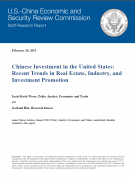
Staff Paper
This report examines recent trends in Chinese investment in the United States, drawing on interviews with state officials. It begins with a general review of Chinese outbound investment patterns, and then looks in more detail at U.S. real estate, industry, and investment promotion. The paper identifies important implications for the United States, including the potential to strengthen regulation of the EB-5 visa program and improve federal support of state efforts.
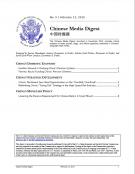
Research
Highlights of this edition: Hurdles Abound in Unifying China’s Pension Systems; China’s Northwest Sees Steel Opportunities on the “One Belt, One Road”; Rethinking China’s “Going Out” Strategy in the High-Speed Rail Industry; Lowering the Reserve Requirement for Chinese Banks: A Smart Move?
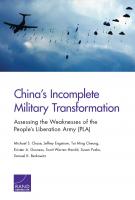
Contracted Research
China’s Incomplete Military Transformation: Assessing the Weaknesses of the People’s Liberation Army
This report examines many of the weaknesses in the PLA’s human capital and organization realms, its combat capabilities across various domains, and China’s defense research and industrial complex. Furthermore, the report analyzes how these weaknesses affect the PLA’s performance of missions tasked by Beijing.

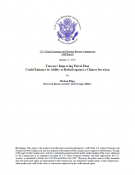
Staff Paper
This report examines recent upgrades to Taiwan’s patrol fleet and implications for Taiwan’s security.
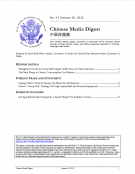
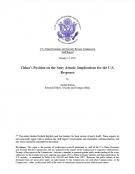
Staff Paper
As the United States weighs options for responding to the widely publicized cyber attack on Sony Pictures Entertainment in November 2014, for which it has attributed responsibility to North Korea, the perspectives and potential reactions of China are of particular interest. This report analyzes four questions regarding China's position: whether it was involved in the attack, prospects for cooperation with the U.S. response, likely reactions to a U.S. counterstrike in cyberspace, and potential for future deterrence based on U.S. actions.

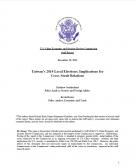
Staff Paper
On November 29, 2014, Taiwan held a series of local elections for 11,130 positions, including mayors, county magistrates, city and county councilors, township chiefs, and village and borough chiefs. This staff report provides an overview of the election results and assesses their implications for cross-Strait relations from now until Taiwan’s presidential election in 2016.
